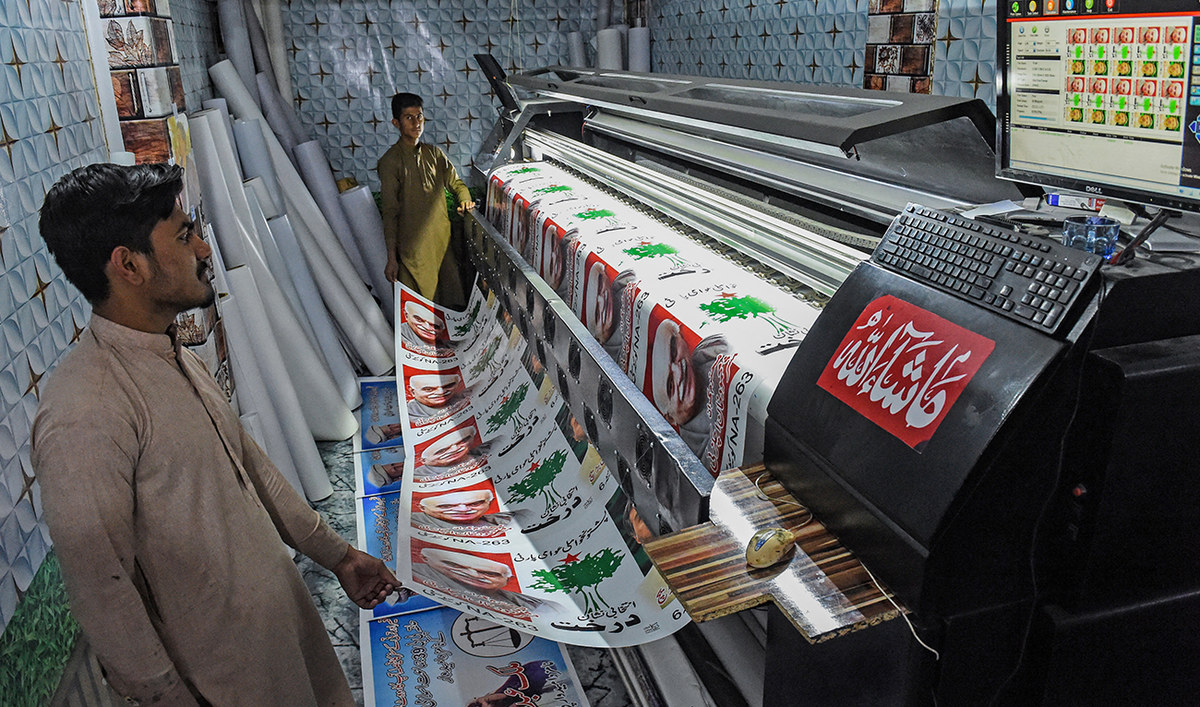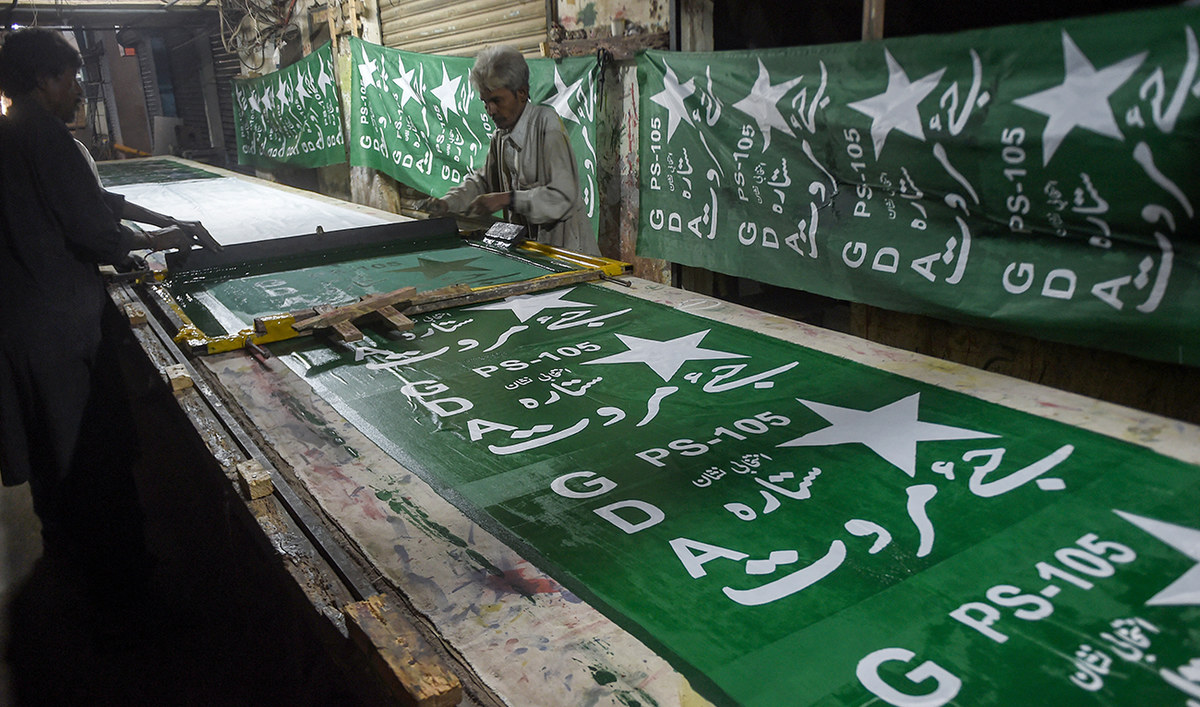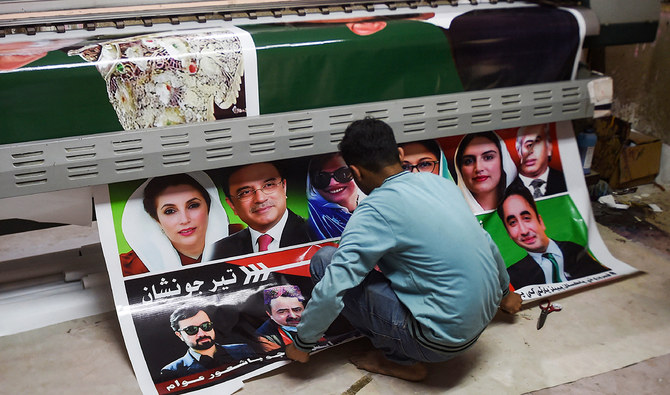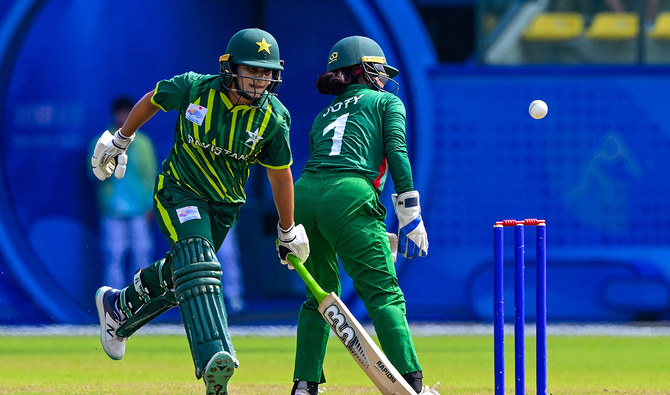PESHAWAR: As a chugging sound echoes at regular, brief intervals, Jahangir Khan, 35, keenly observes sheets of paper passing through a large machine that prints various features, slogans and promises on them inside his shop in the northwestern Pakistani city of Peshawar.
Khan’s business usually booms in the election season, but this time he is far from witnessing the same number of orders he previously received amid rampant inflation and political uncertainty in the country.
Elections in the politically and economically troubled South Asian nation were originally due to be held in November, 90 days after the dissolution of the lower house of parliament in August, but they are now scheduled for February 8 due to fresh demarcation of constituencies under a new census.
Khan, who runs a printing press at Peshawar’s Jhangi Mohalla Printing Press Market, sees the upcoming national elections as a “joke,” given their stark difference from the past electoral contests.
“In the 2018 elections, work was very high, that was an election,” Khan told Arab News. “This time it is a joke, we hardly get one, two or three election-related orders. In my shop, only two orders are being completed right now.”

Workers print election posters on a printing press in Quetta on January 8, 2024, ahead of the upcoming general elections. (AFP/File)
Khan’s shop is one of 5,000 printing presses in the Jhangi Mohalla Printing Press Market, which employs more than 9,000 workers.
But despite the national elections approaching, the market wears a deserted look as compared to the buzz witnessed during the previous elections.
Zafar Khattak, president of the Jhangi Mohalla Printing Press Market association, says in the previous elections, candidates got ample time to run their campaigns which benefitted their business. He said workers at the market would work day and night for at least two months to meet the orders in the past.
“These are [hard] times for the printing industry, like politicians,” Khattak told Arab News.
The 52-year-old said printing press owners and related industry had the materials, including printing paper and ink, stored, but they got only around 20 days for the printing of posters and pamphlets for election candidates before the country goes to polls on Feb. 8.
“The work is going on, but it is not of the level that is required,” Khattak said. “In the past, we would expect [more], but now we work half a night and pay the bills of electricity and rents of shops, and the ones in debt are hardly able to pay their debts.”

Workers using screen printing method print election banners for the Grand Democratic Alliance (GDA) party, at a workshop in Karachi on January 12, 2024, ahead of the upcoming general elections. (AFP/File)
On January 13, the Election Commission of Pakistan allotted symbols to election candidates and political parties contesting the upcoming polls, after which political parties and their nominees as well as independent candidates have kicked off their mass contact campaigns.
Sohail Ahmad, provincial spokesperson for the ECP, said a pending verdict on the ECP’s decision to withdraw ‘bat’ election symbol from ex-PM Imran’s party delayed the allotment of poll symbols.
“This time, political parties got less time [for campaigning] because the symbols were allotted some six-seven days late because of the court decision on Pakatan Tehreek-e-Insaf’s bat symbol,” Ahmad told Arab News.
Election commission normally allots symbols to political parties and candidates around 25 days before the polling day after which political parties and candidates formally kick off their campaigns, according to Ahmad. Electioneering comes to an end 48 hours before the election day.
The ECP delayed the elections to February 8 to demarcate electoral constituencies under a new census held last year. The acceptance and rejection of candidatures and appeals by candidates against them as well as a precarious security situation, particularly in KP, have continued to cast doubts about the conduct of polls in recent weeks.
Malak Sajjad, who is contesting the provincial assembly election from PK-16 constituency in Khyber Pakhtunkhwa’s Lower Dir district on the Awami National Party’s ticket, said they were not sure of the conduct of the elections this time and were still getting their banners printed.
“We have just kicked off our campaigns and are trying to get the banners printed and party flags installed at different locations,” said the candidate, who also took part in the 2018 elections.
“It was confusing this time whether the elections would take place or not, so we started our campaign only three, four days ago and the printing of [banners, etc] has gone down by up to 40 percent.”
During the 2018 elections, Sajjad said, things were clear and they had started campaigning even before the allotment of a poll symbol to him. He, however, said they were also more focused on social media this time as compared to the past.
“We are a little more focused on social media as it has a large presence of youth and we are trying to appeal to them,” the ANP candidate said.
Khattak also pointed out inflation as a factor behind the slow pace of election-related activity at the market.
“We would take a sticker (printing paper) at Rs22-23 [hundred per packet] in the past and now it is 40-45 [hundred per packet],” he regretted. “This is the situation.”
The cost of printing posters and stickers has also increased manifolds as compared to the 2018 national elections, according to Khan.
This has forced candidates to cut down on the election expenses, including printing of banners, posters and handouts.
“The candidates take rate from so many shops and the one giving them the lowest price is given the order and [that too of] hardly a thousand posters,” he said.
“During previous elections, we would print 10 thousand, 15 thousand and up to 20 thousand, now no one brings an order of more than a thousand pieces.”
















